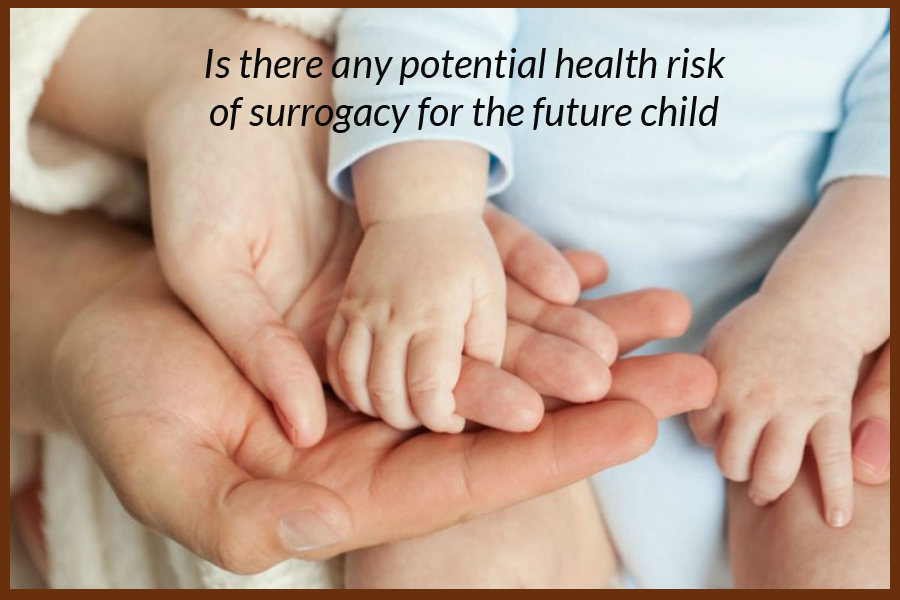Surrogacy comes as a lengthy process with some really critical medical procedures involved. So, as an intended parent plan to pursue surrogacy, they may need to pass through various challenges and risks. In this blog, we will talk about the potential negative effects of surrogacy and try to figure out the answer to a frequently searched question, is there any health risk of surrogacy on child? while taking into account all the key aspects.
Is there any health risk of surrogacy on child? Potential health risks
The gestational surrogacy and the surrogate mother‘s health may present physical health risks to the child born through surrogacy. Also, the well-being of the unborn child may be impacted by elements like substance exposure, maternal health issues, or maternal lifestyle decisions during pregnancy. That said, medical professionals must make sure that the surrogate mother receives the necessary medical attention during every phase of the surrogacy program.
On the other side, once the intended parents use their own gametes, the future child will share at least some genetic traits with at least one of the intended parents.
 However, if donor gametes are used, the child might inherit genetic traits from individuals who are not responsible for raising them. So, this might lead to concerns about genetic identity and potential health problems brought on by unidentified or undisclosed genetic factors.
However, if donor gametes are used, the child might inherit genetic traits from individuals who are not responsible for raising them. So, this might lead to concerns about genetic identity and potential health problems brought on by unidentified or undisclosed genetic factors.
Emotional and psychological side effects:
Identity and Belonging: The child may have concerns about their identity and sense of belonging as a result of surrogacy in Georgia. Moreover, children born through surrogacy might be curious or grieve over their genetic relationship with the surrogate mother. Besides, this might cause them to experience emotional difficulties with their sense of self-identity, their place in the family, and their comprehension of biological and social connections.
Also, the process of disclosing the child’s surrogacy origin can have emotional repercussions. Besides, the timing and manner of the child’s disclosure of their surrogacy history may have an impact on their emotional health and family dynamics. That said, a supportive environment can be created by maintaining open and honest communication within the family and addressing any worries or confusion the child may have.
Social Stigma and Peer Relationships: Due to their unusual family structure, children born through surrogacy or even gay surrogacy in Georgia may experience social stigma or prejudice. Moreover, the child’s sense of self-worth, sense of belonging, and general psychological well-being may be negatively impacted by negative responses from peers or society. Additionally, potentially negative experiences can be lessened by fostering an open and encouraging environment at home and by raising awareness of surrogacy.
Parent-Child Bonding: The relationship between the child, the intended parents, and the surrogate mother sometimes gets complex. Also, the special circumstances surrounding the child’s conception and birth may necessitate additional effort and thought in establishing and nurturing the parent-child bond. On the other hand, developing a strong and healthy parent-child relationship requires open communication, emotional support, and trust-building. Moreover, this process is highly required during surrogacy for same-sex.
How successful is gestational surrogacy?
 It has been demonstrated that gestational surrogacy, a type of surrogacy in which the surrogate mother carries a child conceived through in vitro fertilization (IVF) using the intended parents’ or donor gametes, has a high success rate for achieving pregnancy and live births. That said, the intended parents’ age and health, the quality of the embryos transferred, and the overall level of medical and emotional support given throughout the procedure can all affect how successful gestational surrogacy is.
It has been demonstrated that gestational surrogacy, a type of surrogacy in which the surrogate mother carries a child conceived through in vitro fertilization (IVF) using the intended parents’ or donor gametes, has a high success rate for achieving pregnancy and live births. That said, the intended parents’ age and health, the quality of the embryos transferred, and the overall level of medical and emotional support given throughout the procedure can all affect how successful gestational surrogacy is.
Pregnancy Rates: It has been reported that gestational surrogacy (even during gay surrogacy in Georgia) has pregnancy rates that range from 40% to 60% for each embryo transfer cycle. Moreover, this rate of success is comparable to that of IVF and other assisted reproductive technologies. Besides, the likelihood of conceiving depends on a variety of elements, including the embryo’s quality, the surrogate mother’s uterine environment, and the general health of the surrogate and the intended parents.
Live Birth Rates: In general, gestational surrogacy has favourable live birth rates. Also, depending on a number of variables, including the age of the intended parents and the number of embryos transferred, studies have shown live birth rates per embryo transfer cycle ranging from 30% to 50%. That said, younger, healthier embryos are typically used, leading to higher success rates.
Success Factors: A number of things can affect how well a gestational surrogacy, even in the case of surrogacy for the same sex in Georgia, goes. Furthermore, the intended parents’ age and health are very important because advanced maternal age or specific medical conditions may affect the quality of the embryos created.
Multiple Embryo Transfers: By placing more than one embryo in the surrogate’s uterus, multiple embryo transfers can raise the success rate of conception. Furthermore, the risks of multiple pregnancies must be taken into account, including the increased likelihood of complications for the surrogate mother and the children. Also, to reduce the risk of multiple pregnancies while maintaining reasonable success rates, many medical professionals now support single embryo transfer.

Support: The psychological and emotional well-being of all parties involved in gestational surrogacy, including the intended parents and the surrogate mother, can have an impact on the journey’s overall success. That said, the likelihood of a successful outcome can be increased with the help of emotional support, counselling, and open communication throughout the process.
Yet, it is crucial to remember that success rates can change based on individual circumstances as well as the particular medical practices and protocols used by fertility clinics. So, we can say that gestational surrogacy may be successful depending on the skill and experience of the medical professionals involved as well as adherence to best practices and moral standards.
Final words
Finally, studies on gestational surrogacy have shown that it has a high rate of success in resulting in pregnancy and live births. Still, the intended parents’ age and health, the quality of the transferred embryos, and the overall level of medical and emotional support can all affect how well gestational surrogacy goes. That said, the intended parents can improve their chances of a successful outcome in gestational surrogacy in Georgia by taking into account these factors and collaborating closely with medical professionals.



No Comments